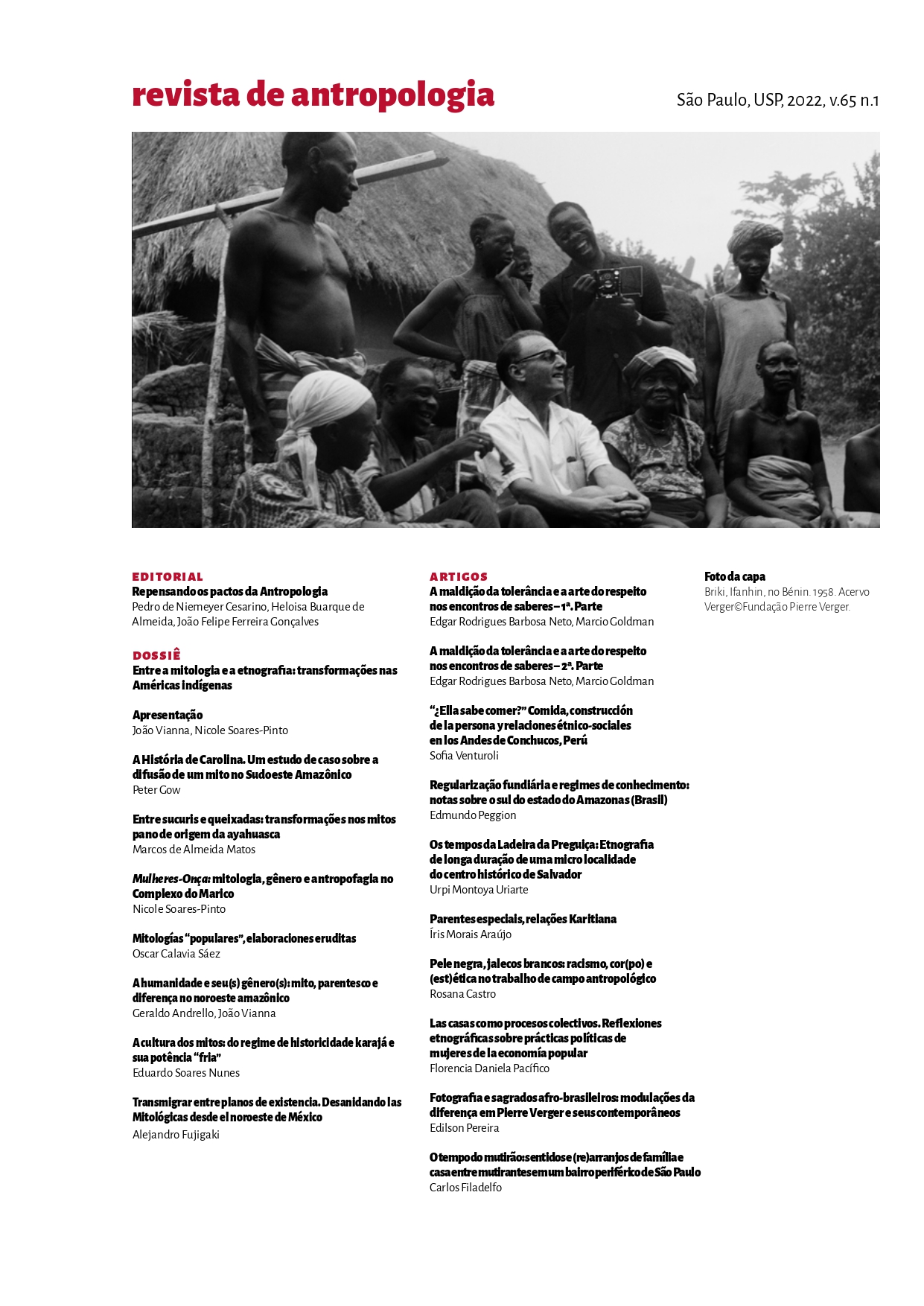O tempo do mutirão: sentidos e (re)arranjos de família e casa entre mutirantes em um bairro periférico de São Paulo
DOI:
https://doi.org/10.11606/1678-9857.ra.2022.192798Palabras clave:
Casa, Família, Gênero, Movimentos de moradia, SofrimentoResumen
O Movimento dos Trabalhadores Sem Terra Leste I é um movimento social de luta por moradia que historicamente, desde a década de 1980, obtém atendimento para famílias militantes via mutirão autogestionário. O aqui denominado ‘tempo do mutirão’ refere-se a uma marcação temporal por parte dos mutirantes do período de duração do mutirão, desde o alcance da pontuação necessária e a decisão em de fato integrar uma demanda específica, passando por todo o processo de obra e chegando à mudança para a nova casa. Este artigo discute as inter-relações entre os termos família e casa a partir de narrativas de mutirantes da Leste I, sobre seus (re)arranjos familiares e domésticos durante e depois do mutirão a fim de realizar algumas reflexões etnográficas sobre as relações entre Estado e movimentos de moradia no atendimento habitacional a essas famílias.
Descargas
Referencias
ALMEIDA, Mauro. 1986. “Redescobrindo a família rural”. Revista Brasileira de Ciências Sociais, vol.1, n.1: 63-83.
CALDEIRA, Tereza P. R. 1984. A política dos outros. O cotidiano dos moradores da periferia e o que pensam do poder e dos poderosos. São Paulo: Editora Brasiliense.
CALDEIRA, Tereza P. R. 2000. Cidade de muros: crime, segregação e cidadania em São Paulo. São Paulo: Edusp/Ed. 34.
CANELLA, Francisco. 2020. “Mulheres e luta por moradia Mudanças nas práticas associativas nas periferias de Florianópolis e Lisboa”. Cadernos do CEAS: Revista Crítica de Humanidades, vol. 45, n. 251: 658-674. DOI https://doi.org/10.25247/2447-861X.2020.n251.p658-674
CARSTEN, Janet (ed.). 2000. Cultures of relatedness. New approaches to the study of kinship. Cambridge: Cambridge University Press.
CARSTEN, Janet; HUGH-JONES, Stephen (orgs.). 1995. About the house. Lévi-Strauss and beyond. Cambridge: Cambridge University Press.
COMERFORD, John C. 2003. Como uma família: sociabilidade, territórios de parentesco e sindicalismo rural. Rio de Janeiro: Relume Dumará.
FILADELFO, Carlos. 2015. A luta está no sangue: família, política e movimentos de moradia. São Paulo, Tese de doutorado, Universidade de São Paulo.
FILADELFO, Carlos. 2017. “Os sentidos de política na luta por moradia em São Paulo”. In: COMERFORD, John; BEZERRA, Marcos Otávio; PALMEIRA, Moacir (org.) Questões e dimensões da política. Rio de Janeiro: Papéis Selvagens, p. 125-140.
FONSECA, Claudia. 2000. Família, Fofoca e Honra: etnografia de relações de gênero e violência em grupos populares. Porto Alegre: Ed. Universidade/ UFRGS.
FONSECA, Claudia. 2006. Caminhos da adoção. São Paulo: Cortez.
FORTES, Meyer. 1974. “O ciclo do desenvolvimento do grupo doméstico”. Cadernos de Antropologia 6. Brasília: Editora Universidade de Brasília.
FOUCAULT, Michel. 2005. Em defesa da sociedade. São Paulo: Martins Fontes.
FOUCAULT, Michel. 2008. Nascimento da biopolítica. São Paulo: Martins Fontes.
GELL, Alfred. 1998. “Strathernograms, or, the semiotics of mixed metaphors”. In: The Art of Anthropology. Essays and Diagrams. London/New Brunswick: The Athlone Press, p. 29-75.
HERZFELD, Michael. 2008. Intimidade cultural: poética social no Estado-Nação. Lisboa, Portugal: Edições 70.
KOWARICK, Lúcio. 2000. Escritos urbanos. São Paulo: Editora 34.
LOERA, Nashieli Rangel. 2009. Tempo de acampamento. Campinas, Tese de doutorado, Universidade de Campinas.
MARCELIN, Louis H. 1996. A Invenção da Família Afro-Americana: família, parentesco e domesticidade entre os negros do Recôncavo da Bahia. Rio de Janeiro, Tese de Doutorado. Museu Nacional da Universidade Federal do Rio de Janeiro.
PISCITELLI, Adriana. 2006. Jóias de família: gênero e parentesco em histórias sobre grupos empresariais brasileiros. Rio de Janeiro: Editora UFRJ.
ROLNIK, Raquel. 1997. A cidade e a lei: legislação, política urbana e territórios na cidade de São Paulo. São Paulo: Fapesp; Studio Nobel.
SCHNEIDER, David. 1984. A Critique of the study of kinship. Ann Arbor, University of Michigan Press.
STRATHERN, Marilyn. 1981. “Self-Interest and the Social Good: Some Implications of Hagen Gender Imagery”. In: ORTNER, Sherry; WHITEHEAD, Harriet (ed.). Sexual Meanings. The Cultural Construction of Gender and Sexuality. Cambridge: Cambridge University Press.
STRATHERN, Marilyn. 2006. O gênero da dádiva: problemas com as mulheres e problemas com a sociedade na Melanésia. Campinas, SP: Editora da Unicamp.
VILLAÇA, Flávio. 1998. Espaço intra-urbano no Brasil. São Paulo: Studio Nobel.
Descargas
Publicado
Número
Sección
Licencia
Derechos de autor 2022 Revista de Antropologia

Esta obra está bajo una licencia internacional Creative Commons Atribución 4.0.
Autores que publicam na Revista de Antropologia concordam com os seguintes termos:
a) Autores mantém os direitos autorais e concedem à revista o direito de primeira publicação, com o trabalho simultaneamente licenciado sob a Licença Creative Commons Attribution que permite o compartilhamento do trabalho com reconhecimento da autoria e publicação inicial nesta revista.
b) Autores têm autorização para assumir contratos adicionais separadamente, para distribuição não-exclusiva da versão do trabalho publicada nesta revista (ex.: publicar em repositório institucional ou como capítulo de livro), com reconhecimento de autoria e publicação inicial nesta revista.
c) Autores têm permissão e são estimulados a publicar e distribuir seu trabalho online (ex.: em repositórios institucionais ou na sua página pessoal) após o processo editorial, já que isso pode gerar alterações produtivas, bem como aumentar o impacto e a citação do trabalho publicado (Veja O Efeito do Acesso Livre).




